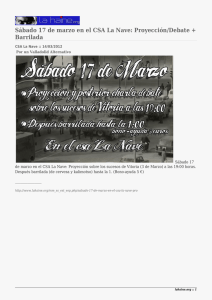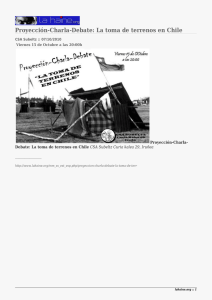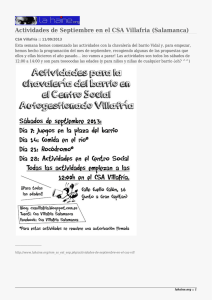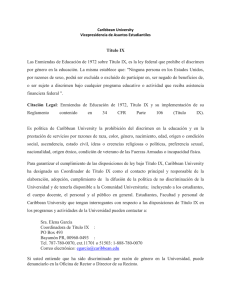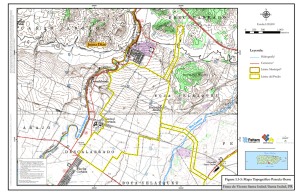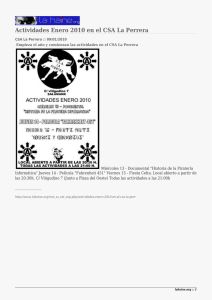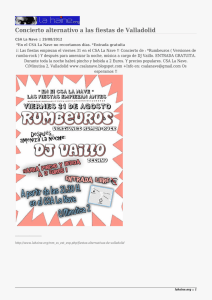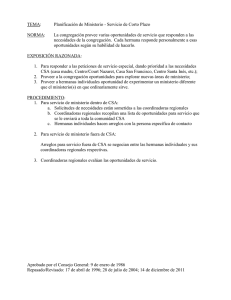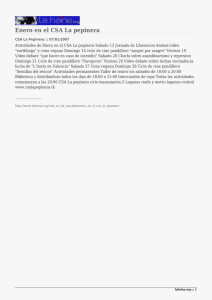MESSAGE FROM THE PRESIDENT MESSAGE FROM THE VICE
Anuncio
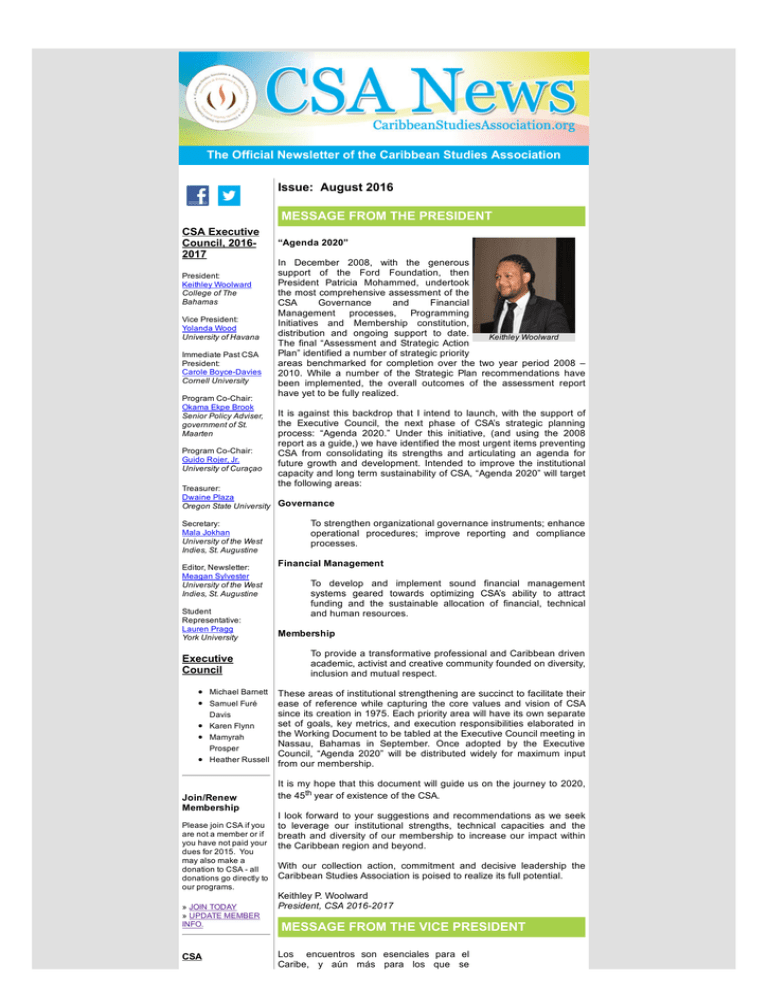
The Official Newsletter of the Caribbean Studies Association Issue: August 2016 MESSAGE FROM THE PRESIDENT CSA Executive Council, 2016­ 2017 President: Keithley Woolward College of The Bahamas Vice President: Yolanda Wood University of Havana Immediate Past CSA President: Carole Boyce­Davies Cornell University Program Co­Chair: Okama Ekpe Brook Senior Policy Adviser, government of St. Maarten Program Co­Chair: Guido Rojer, Jr. University of Curaçao “Agenda 2020” In December 2008, with the generous support of the Ford Foundation, then President Patricia Mohammed, undertook the most comprehensive assessment of the CSA Governance and Financial Management processes, Programming Initiatives and Membership constitution, distribution and ongoing support to date. Keithley Woolward The final “Assessment and Strategic Action Plan” identified a number of strategic priority areas benchmarked for completion over the two year period 2008 – 2010. While a number of the Strategic Plan recommendations have been implemented, the overall outcomes of the assessment report have yet to be fully realized. It is against this backdrop that I intend to launch, with the support of the Executive Council, the next phase of CSA’s strategic planning process: “Agenda 2020.” Under this initiative, (and using the 2008 report as a guide,) we have identified the most urgent items preventing CSA from consolidating its strengths and articulating an agenda for future growth and development. Intended to improve the institutional capacity and long term sustainability of CSA, “Agenda 2020” will target the following areas: Treasurer: Dwaine Plaza Oregon State University Governance Secretary: Mala Jokhan University of the West Indies, St. Augustine Editor, Newsletter: Meagan Sylvester University of the West Indies, St. Augustine Student Representative: Lauren Pragg York University Executive Council Michael Barnett Samuel Furé Davis Karen Flynn Mamyrah Prosper Heather Russell Join/Renew Membership Please join CSA if you are not a member or if you have not paid your dues for 2015. You may also make a donation to CSA ­ all donations go directly to our programs. » JOIN TODAY » UPDATE MEMBER INFO. CSA To strengthen organizational governance instruments; enhance operational procedures; improve reporting and compliance processes. Financial Management To develop and implement sound financial management systems geared towards optimizing CSA’s ability to attract funding and the sustainable allocation of financial, technical and human resources. Membership To provide a transformative professional and Caribbean driven academic, activist and creative community founded on diversity, inclusion and mutual respect. These areas of institutional strengthening are succinct to facilitate their ease of reference while capturing the core values and vision of CSA since its creation in 1975. Each priority area will have its own separate set of goals, key metrics, and execution responsibilities elaborated in the Working Document to be tabled at the Executive Council meeting in Nassau, Bahamas in September. Once adopted by the Executive Council, “Agenda 2020” will be distributed widely for maximum input from our membership. It is my hope that this document will guide us on the journey to 2020, the 45th year of existence of the CSA. I look forward to your suggestions and recommendations as we seek to leverage our institutional strengths, technical capacities and the breath and diversity of our membership to increase our impact within the Caribbean region and beyond. With our collection action, commitment and decisive leadership the Caribbean Studies Association is poised to realize its full potential. Keithley P. Woolward President, CSA 2016­2017 MESSAGE FROM THE VICE PRESIDENT Los encuentros son esenciales para el Caribe, y aún más para los que se CONFERENCE consagran a su estudio e investigación. Son ANNOUNCEMENTS los espacios necesarios para el diálogo y el CSA Nassau 2017 intercambio con miradas abiertas y cruzadas. Resultan imprescindibles para Culture and Knowledge componer las visiones contemporáneas y Economies: The future las de la contemporaneidad sobre el tiempo of Caribbean pasado. A los venidos de múltiples latitudes, Development ? portadores de saberes también múltiples, la CSA ha brindado­ en sus más de cuarenta Nassau, The Bahamas ediciones –uno de esos sitios privilegiados June 5th­10th 2017 The Call for Papers will para pensar el Caribe desde diversos enfoques disciplinarios. Un espacio así es be open in September Yolanda Wood 2017. Stay tuned to the de la mayor importancia para las tareas CSA web site and científicas y culturales que esta región propone y requiere. follow us on Facebook and Twitter for updates. CALL FOR PAPERS Caribbean Review of Gender Studies Special Issue Fundada en la segunda mitad del pasado siglo, la CSA ha transitado un largo itinerario de variadas experiencias en más de una veintena de territorios tanto de las islas como de las costas continentales y otros espacios integrados a esa geografía extendida por razones históricas y culturales, lo que determina una región de bordes que se amplían para incluir también a sus diásporas dispersas. Esas décadas finales del siglo XX fueron prodigiosas para el Caribe en sus proyecciones regionales e internacionales. Significaron nuevos momentos para buscar alternativas a la profundización y el mejor conocimiento de la región, así como para su difusión continental y global. La CSA se inscribe en esa tendencia de transversalidad caribeña y del espacio caribe como eje de atracción para la reflexionar sobre tantos y tantos temas que interesan al pensamiento social y cultural y que tienen un laboratorio activo en las tierras del Caribe. En correspondencia con esos buenas intenciones, la Caribbean JOB Studies Association ha superado claramente cualquier visión parcial de ANNOUNCEMENTS los estudios caribeños, para ofrecer – cada vez más­ un panorama amplio y complejo de sus múltiples expresiones, involucrando las Assistant ciencias sociales, las humanidades y la cultura en una perspectiva Professor in más integradora que comprende la significación de todas las formas de habitar ese espacio a través de las etapas de la historia, así como British, French, and/or Spanish las significativas prácticas culturales que viven en lo popular, con todos sus conflictos de pobreza, deterioro y marginalidad. En todo ese Caribbean contexto, la naturaleza se presenta fundamental por aportar una Postdoctoral dimensión trascendente a la relación del individuo con el medio, ya Positions in sea construido o natural. Digital Humanities and African American History and Culture A través de mi participación en congresos de la Asociación, en distintos momentos y países, se me ha hecho evidente esta vocación sostenida por hacer más dinámica la visión sobre el Caribe mismo, y la importancia de mantener la continuidad de estudios e investigaciones, lo que se muestra incuestionable con la presencia de nuevas generaciones de profesionales que hacen pensar en un futuro intenso para la organización entrado ya el nuevo milenio. El Presidente Keithley Woolward, es en la actualidad el más joven de los que haya tenido la CSA, lo que me parece altamente representativo. Como Vicepresidenta electa en el congreso recién concluido en Haití, me siento muy alentada de poder contribuir a esos esfuerzos, sintiendo además el doble valor simbólico de haber sido votada en ese emblemático territorio, fundador de una nueva etapa de la historia regional y porque también es primera vez que un cubano integra la dirección de la CSA. Todos son motivos alentadores. Y ahora la CSA encamina su sede hacia Bahamas en 2017, territorio de cientos de islas, cayos e islotes, formando un mapa de plena insularidad. Se diría que esa imagen archipiélica nos remite a la manera glissantiana de pensar la antillanidad, que se advierte y confirma para Bahamas con los datos que la historia aporta, desde los tiempos de los pueblos originarios que la habitaron. Se encuentran situadas en el extremo nororiental del Caribe, en aguas atlánticas, que con su fuerza no solo inundan la cuenca caribeña sino que intervienen en la visibilidad de las muchas islas según las mareas y su intensidad. Las Bahamas son espacio genésico para la historia americana. Las también conocidas como Lucayas nos remiten al primer encuentro, hace más de quinientos años. Como tantos otros territorios caribeños fueron colonizadas por españoles primero y por otros después, los ingleses, para integrar la rica diversidad que identifica a esta región a la que, sin dudas Bahamas pertenece como espacio de plantaciones que fue, de esclavitud y amplia descendencia de origen africano hasta la actualidad. Ese universo de lo común y lo diferente que el Caribe nos muestra es una de sus riquezas mayores, lo que configura un inacabable espacio para la investigación. Propiciar desde la CSA esa penetración mayor a la diversidad caribeña para comprendernos como parte de un conglomerado humano en el que trascienden su historia y cultura, es uno de los propósitos que me inspira en la vicepresidencia que acabo de asumir. Poner en valor esa riqueza que nutre la identidad de los pueblos del Caribe expresada en su multilingüismo y en la variedad de sus expresiones artísticas y culturales revela ciertas claves para pensar la diversidad cultural de los pueblos caribeños, los de sus islas, costas continentales y sus diásporas. En Bahamas 2017 se hará realidad el verdadero descubrimiento, el que hacemos nosotros mismos para manifestar las complejas dimensiones de un todo de muchas partes, en la que se interpenetran lo escrito y lo oral, lo gestual y lo sígnico visual, lo musical y lo danzario. En ese “todo mezclado” , según palabras de Nicolás Guillén se inscribe un pensamiento que desdibujan las fronteras de las balcanizaciones, los prejuicios y las discriminaciones, para comprender lo caribeño como un valor cultural, creado a través del tiempo por una sucesión de pueblos, venidos o traídos desde muchas latitudes. En ese entramado de creencias, saberes, prácticas y modos de entender el mundo se distingue el espacio caribe, que tanto necesita de nuestras acciones individuales y colectivas para comunicarse y dialogar, cooperar y proyectarse. La CSA ha sido y es un espacio esencial para tales propósitos de presente y futuro. Yolanda Wood Vice President, CSA 2016­2017 English Encounters are essential for the Caribbean, and all the more so for those who are dedicated to the study and research of the Caribbean. These are the necessary spaces for dialogue and exchange, with an open mind and engaged gaze. Meetings are indispensable if we are to build up a contemporary image of the Caribbean from times past. For many people from different latitudes, bearers of a diverse knowledge, the CSA has offered –in more than forty annual conferences­ one of these privileged spaces for developing Caribbean thought from different disciplinary areas. Such a space is of the greatest importance for fulfilling the scientific and cultural tasks that the region faces. Founded in the second half of the twentieth century, the CSA has passed through a long itinerary of varied experiences, in more than twenty different territories, islands and mainland coastal regions as well as other spaces integrated into this Caribbean geography, through historical and cultural reasons, therefore outlining a region with boundaries that amplify to include disperse diasporas. Those final decades of the twentieth century were prodigious for the Caribbean and its regional and international projections. It signified a moment for finding alternatives deep within the greater knowledge of the region itself, as well as for continental and global dissemination. The CSA inscribes itself within this tendency for Caribbean transversality and for understanding the Caribbean space as a key axis to reflect on so many themes of social and cultural theory, themes that comprise an active laboratory for discussion in the Caribbean region. In accordance with those good intentions, the CSA has clearly surpassed any partial vision of Caribbean studies, and offers –and ever more so­ an ample and complex panorama of its multiple dimensions, involving the social sciences, the humanities and culture in a more integrative perspective that includes giving significance of to all forms of living this Caribbean space, through different historical periods as well as the significant cultural practices living in the popular space, with all its conflicts of poverty, deterioration and marginality. In this context, nature offers a fundamental and transcendent dimension to the relation between the individual and the environment, either constructed or natural. Through my participation in CSA conferences, in different moments and in a variety of countries, this sustained vocation for a more dynamic vision about the Caribbean itself, has become very evident; so also, the importance for maintaining continuity in studies and research, demonstrated clearly in the unquestionable presence of new generations of scholars who enable us to envisage an intense future for the organization as it enters the new millennium. President Keithley Woolward is currently the youngest president the CSA has ever had, which is to me extremely significant. As Vice­president elected during the recent Conference in Haiti, I feel encouraged to be able to contribute to these efforts, and also to recognize the double symbolic significance of having been elected in this most emblematic of territories, founder of a new stage in regional history and because it is also the first time that a Cuban has participated in the leadership of CSA. All these are promising motives. And now CSA walks forward to its next encounter in Bahamas, in 2017, a territory of hundreds of islands, keys and islets, forming its own insular map. One could say that that archipelagic image invokes the Glissantian way of looking at Caribbeanness, prefigured and confirmed in the Bahamas, with historical data, from the times of the original inhabitants. These islands are situated in the extreme north east of the Caribbean, in Atlantic waters, whose force not only floods across the Caribbean basin but also intervenes in the visibility of many islands, according to the tides and their intensity. The Bahamas are a genetic space for the history of the Americas. Also known as the Lucayan Archipelago they take us back to the first encounter, over 500 years ago. Like so many other Caribbean territories the Spanish colonized first, followed afterwards by others –the English­ thus integrating a rich diversity that identifies this region and marks the Bahamas as a Caribbean space of plantations, slavery and African heritage. That universe of the “common and the diverse” that the Caribbean displays to us, is one of its greatest strengths, and a never ending source for research and study. To be able to foment this move to a greater diversity from within CSA, and to encourage a greater understanding of ourselves as part of a human complex that transcends history and culture, is one of the aims that inspires me in the vice­presidency that I have just embarked on. Valuing the wealth that nourishes Caribbean identity, expressed in its multilingualism and in the variety of its artistic and cultural expressions, reveals certain clues for thinking about the cultural diversity of the Caribbean people, of its islands, mainland coasts and diaspora. At the Conference in Bahamas 2017 the true “discovery” will happen: the one we make ourselves, to reveal the complex dimensions of the “all of many places”, where the oral and the written word interconnect with performance, visual arts, music and dance. In this “whole mixed together”, to cite Nicolas Guillén, a way of thinking is inscribed, that blurs the boundaries of balkanizations, prejudice and discrimination, and leads to understanding Caribbeanness as a cultural value, created through time, through a succession of peoples who arrived at, or who were brought to, the Caribbean from so many places. In this web of beliefs, knowledge, practices and ways of understanding the world, the Caribbean space stands out; and it greatly needs our individual and collective actions for communication, dialogue, cooperation and projection. The CSA has been and is an essential space for these purposes, now and in the future. Yolanda Wood Vice President, CSA 2016­2017 MESSAGE FROM THE PROGRAM CHAIRS Guido Rojer, Jr. Okama Ekpe Brook Having just left the concrete reality of the Haitian capital Port­au­Prince two months ago, we settle in to the digital infrastructure that powers the Caribbean Studies Association as we plan the CSA 2017 Conference in, Nassau, The Bahamas. With the Caribbean Sea separating us physically we take up the responsibilities as program co­chairs with many whatsapp messages, emails, and meetings over skype. These technological advancements transcends beyond the “borders” that limited those who came before us, while also offering a multiplicity opportunities for our organization and especially for our annual conference gathering. From the administrative offices of the College of the Bahamas, to the government building of St. Maarten, and the scientific quarters of the University of Curaçao we piece together ideas for our next exchange of research, activist agendas and creative work to be held in Nassau in June upcoming. It is therefore necessary to give a sneak peak to what the call for papers will look like. “Knowledge and Culture Economies: The Future of Caribbean Development?” is the theme for our next conference. The Caribbean has come a long way in “development” (a term which has its own problematic definitions and applications), but still falls short as a region with respect to competitiveness, relevance and economic impact, other than the tourism offerings for the North. Creative industries, African rooted cultural practices and traditional and artisanal Knowledge Economies abound across the Caribbean region from Caribbean theater, film and visual arts, to rhyming spirituals, to bush medicine, goat skin drums and the indigenous retentions in Papiamento and kreyol poetry and literature. Can these forms of Caribbean cultural being form the basis of a new and or different model through which to (re)imagine, (re)theorise the future of Caribbean development? Our next conference will open up this discussion among ourselves, with the intention to refocus our attention to developing our ideas into tangible products for the Caribbean peoples, wherever they may be. Guido Rojer, Jr. Okama Ekpe Brook Program Chairs, CSA 2016­2017 MESSAGE FROM THE EDITOR I wish to take this opportunity to wish all new and returning members of the Caribbean Studies Association warm August greetings! After completing our successful annual conference in Haiti last June, we are poised and on the cusp of another year of hard work and due diligence as we remain committed to building, developing and growing our Caribbean academic community. As we look towards the future, The Caribbean Studies Association is determined to effect strategies that would ensure that we “be the change that we want to see”. To my team members on the Newsletter Editorial Committee I Meagan Sylvester salute you for a job well done over the last year. Together with you, I pledge to make the next year, the best in our delivery of examples of academic excellence, public service and community engagement. There has been a changing of guards at the organisation’s helm and I want to say a heartfelt welcome to our new President Keithley Woolward and our new Vice­President, Yolanda Wood. I look forward to working with you both esteemed scholars. Here’s looking forward to exciting new academic journeys at the Caribbean Studies Association. Please feel free to email the Newsletter Editor directly at [email protected] to share your views, comments and the good news of your academic success with us. Meagan Sylvester Newsletter Editor Caribbean Studies Association MESSAGE FROM THE LANGUAGE SUB­EDITORS Nouvèl (Martinican French Creole) ASOSYASYON ETID KARAYIB­LA Asosyasyon Etid Karayib­la fondé an 1975. Sa kè kawant an pasé ki i ka travay anpil mété réjyon Karayib­la an valè. Organiz tala pa ka fè lajan mé I ni an lo lektè, pwofésè, étidyan twazyèm sikle, moun ki adan larechèch ki ka enmen kilti, istwa, ékonomi, mizik, lang, relasyon ant nonm épi fanm, sosyoloji di réjyon nou. Hélène Zamor Pwézidan an ka chwazi an péyi dan Karayib­la ou byen yon di Lamérik Santral ou Lamérik Lisid pou fè konférans­li chak lanné. Sé manb­la pé pale di travay yo, fè pwézantasyon yo épi dékouvè kilti péyi­la. Lanné tala, lè nou té Ayiti, nou wè moun ki ka dansé Rara épi nou tann bèl vwa Misié James Germain ki sé an chantè Ayisyen. Adan program­la, ni exkursyon osi. Pandan konférans, ni intervenan ki ka vini di an lòt koté ki palé asou tèm ki sé organizatè a chwazi. Ni sijè kon lesklavaj, tansyon rasial, art, imigrasyon é byen dòt ankò. Sé panèl la épi sé sésyon­an byen varié paske asosyasyon ka vwéyé an apèl a la kontribusyon o mwen nèf avan konféran fèt débi mwa jwen. Mé sé partisipan­an pou soumèt rézimé yo a an dat ki komité organizatè ka determine. Lè tout rézimé soumè, ni an komité ki ka gadé si yo ka koresponn épi tèm konférans­lan. Koté févwyé ou mas, sé intervenan ka rivé sav si rézimé yo aksepté ou pa. Komité ka informé yo é sé li ki ka klasé sé intervenan­an silon sa yo kè pwézanté. Pwézidan an épi sé organizatè­a ka egzijé ki sé manm­lan péyé fwè adézyon épi inskripsyon yo. Tout pèman pé fèt a sou internet­la. Pou fè ékonomi papyé, sé organizatè­a ka vwéyé program­la asou internet­la. Sa pli fasil di komuniké sé informasyon­ an. Kon man té ja di sé partisipan­an ka vizité péyi­a é a moman tala ki yo échanjé ant yo swa an lotèl­la, pandan manifestasyon kiltirèl. Asosyasyon­a ni moun di nasyonalité diféran. Fòk di ke sé lanng étwanjé épi lanng vernakulè ni inportans yo. Mèm si angle ka dominé, ni moun ki ka interprété sé pwézantasyon­an an fwansé, an espagnol épi an kwéyòl. Helene Zamor French & Martinican Creole Language Sub­editor CSA Newsletter Español DOS DÉCADAS DE ESTUDIOS SOBRE EL CARIBE DESDE EL TERRITORIO INSULAR COLOMBIANO Vilma Diaz Universidad Nacional de Colombia, Sede Caribe, San Andrés Isla, www.caribe.unal.edu.co Docencia, investigación, publicación e interacción cultural comunitaria constituyen los cuatro pilares en los que sustentan los estudios caribeños desde San Andrés, Isla. Veinte años después, el instituto proyecta un trabajo que, como la corriente del mar caribe, está volcado a unir el continente con las islas. Su impronta trasciende el ámbito nacional y ocupa espacios de socialización académica y cultural a nivel regional. El quehacer profesional del instituto es excelente, merece especial atención destacar la permanencia del programa de Maestría en Estudios del Caribe fundada en el año 2000 y la Maestría en Ciencias­Biología, línea Bilogía Marina que, sin dudas, es uno de los pilares en la Isla del Mar de los Siete Colores. Portada de la Revista Cuadernos del Caribe, No. 20, 2015. Disponible en: http://www.revistas.unal.edu.co/index.php/ccaribe/issue/view/4485/showToc De igual manera felicitamos iniciativas como el Centro de Pensamiento del Gran Caribe y la Revista Cuadernos del Caribe, que en palabras de su directora, la Dra. Yusmidia Solano Suárez, “nuestra meta es que Cuadernos del Caribe se convierta en un medio de publicación, difusión y promoción de la producción de conocimiento realizados desde y para el Caribe, en el marco amplio de los Estudios del Caribe entendidos estos como las propuestas epistémicas, teóricas y metodológicas que nos ayudan a pensar el Caribe desde sí mismo y a desarrollar alternativas a las problemáticas sociales y ambientales de la región.” Ello lo demuestra al publicar en su número veinte el Seminario Especial Bob Marley: región.” Ello lo demuestra al publicar en su número veinte el Seminario Especial Bob Marley: time will tell (Coloquio Internacional “La Diversidad Cultural en el Caribe”, Casa de las Américas, La Habana, 2015) que homenajeó a ese ícono de la cultura caribeña replanteando la vigencia de su pensamiento y legado para las sociedades caribeñas del siglo XXI. Indudablemente, todo ello no representa un proceso aislado, en la última década, la sociedad sanandresana impulsa espacios de interacción cultural que muestran la diversidad cultural del Caribe, su asimetría y permanente recomposición. Es por ello que, desde este espacio, exhortamos al instituto, sus autoridades e investigadores que nos brinden propuestas de investigación de temas referentes a los retos en que se encuentra inmersa tanto la isla como el continente para de esta manera consolidar su posición como un referente obligado para los estudios sobre el Caribe contemporáneo. Invitamos a los lectores a visitar los links, http://caribe.unal.edu.co/la­sede/mision­vision.html y http://www.revistas.unal.edu.co/index.php/ccaribe. En ellos pueden acercarse y constatar el trabajo constante y positivo para la cultura caribeña. Vilma Diaz Spanish Language Sub­editor CSA Newsletter Français L’ASSOCIATION DES ETUDES CARIBÉENNES L’Association des Etudes Caribéennes a été fondée en 1975. Cela fait déjà bien 41 ans qu’elle travaille dur pour promouvoir la Caraïbe sur différents aspects. Cet organisme à but non lucratif Hélène Zamor regroupe un nombre important de lecteurs, de professeurs, d’étudiants du troisième cycle et des chercheurs indépendants qui s’intéressent beaucoup à la culture, l’histoire, l’économie, la musique, les langues, es relations entre les hommes et les femmes, la sociologie dans notre région. Le président choisit un pays de la Caraïbe ou de l’Amérique Centrale et du Sud où a lieu la conférence annuelle. Les membres ont donc l’opportunité de partager leurs recherches, de présenter leurs articles et de découvrir la culture du territoire choisi par le biais d’événements culturels. Cette année à Haïti, nous avons pu voir les danseurs de Rara et entendre la belle voix du chanteur haïtien James Germain. Les excursions font généralement partie du programme de la conférence. Nous devons également souligner que des intervenants extérieurs viennent chaque année parler d’un thème choisi par les organisateurs. Cela peut être l’esclavage, les tensions raciales, les arts, l’immigration etc. Quant aux panels et aux sessions, ils sont diversifiés car l’Association des Etudes Caribéennes diffuse un appel à la contribution au moins neuf mois avant que la conférence n’ait lieu. C’est­à­dire avant le début mois de juin. Les membres qui désirent participer et présenter au colloque annuel sont tenus de soumettre le résumé de leur article à une date déterminée par le comité d’organisation. Une fois soumis, les résumés sont examinés pour voir s’ils correspondent au thème général proposé. C’est vers février ou mars que les intervenants savent si leurs résumés sont acceptés ou pas. Le comité les informe par mèl et se charge de mettre en place des sessions comportant un titre. De cette manière, il peut mieux classer les intervenants selon ce qu’ils vont présenter. Cependant, le président et les organisateurs de la conférence exigent que les intervenants paient leurs frais d’adhésion avant la conférence. Autrement, ils ne pourront pas présenter leur article. Non seulement doivent­ils régler leur frais d’adhésion en tant que membres, mais il leur faut aussi payer les frais d’inscription à conférence. Tout cela peut se faire en ligne grâce à la technologie. Pour économiser du papier, les organisateurs envoie le programme par courrier électronique. Il est alors plus facile de communiquer directement les informations aux membres de l’association. Comme cela a été indiqué auparavant, les participants visitent le pays dans lequel se déroule la conférence. Le comité d’organisation sait joindre l’utile à l’agréable et c’est pour cela que les présentateurs de différentes nationalités se rassemblent et peuvent échanger entre eux. Les échanges se font au moment des manifestations culturelles, au restaurant de l’hôtel ou en­dehors. Les langues étrangères et les langues vernaculaires ont de la valeur. Malgré la forte position de l’anglais par rapport aux autres langues, les organisateurs insistent que les résumés soient traduits en français, en espagnol et même en créole. Des interprètes sont même recrutés pour faire de la traduction. Helene Zamor French & Martinican Creole Language Sub­editor CSA Newsletter GRADUATE STUDENT CORNER Intersectionality Matters As area studies has grown over the past few decades, there have been many opportunities created by people on the margins of power to tell their own stories, and to make use of the resources of large institutions. Disciplines have grown and developed in gender, sexuality, and race studies as well. And while this representation has mattered a great deal to many young scholars growing and defining themselves within the space of post­ secondary education, there is more to be done. As an organization that focuses on the Caribbean region and diaspora, the role of intersectionality cannot be emphasized Lauren Pragg enough. So many of the presentations, conversations and lives of participants at any level of CSA already encompass the idea that Kimberle Crenshaw developed in its current form in 1989. However, it seems undeniable that a greater effort to connect each of our research areas to a larger context of social and political existence and interdependence can only make our field(s) more fertile. “Intersectionality (or intersectional theory) is the study of overlapping or intersecting social identities and related systems of oppression, domination, or discrimination. The theory suggests that—and seeks to examine how—various biological, social and cultural categories such as gender, race, class, ability, sexual orientation, religion, caste, age, nationality and other sectarian axes of identity interact on multiple and often simultaneous levels. The theory proposes that we should think of each element or trait of a person as inextricably linked with [1] all of the other elements in order to fully understand one's identity. ” While this definition seems to suggest a purely sociological use for this theory, I want to urge those outside of social sciences to consider how it may enrich your studies. An environmental science project that also locates the experiences of those who live in the area, and questions the presence of environmental racism? An architectural concept that keeps in mind the class differentials of the residents? A large proportion of CSA members are already doing thoughtful work with intersectionality at its core. As an organization of intellectuals, artists, activists, business people, public servants, etc. intersectionality theory can only offer to connect us more and breathe dimension into our collective gatherings and efforts. ­­­­­­­­­­­­­­­­­­­­­­­­­­­­­­ [1] DeFrancisco, Victoria P.; Palczewski, Catherine H. (2014). Gender in Communication. Thousand Oaks, California: Sage. p. 9. ­­­­­­­­­­­­­­­­­­­­­­­­­­­­­­ Lauren Pragg Graduate Student Representative CSA 2015­ 2017 CSA MEMBERS IN THE NEWS Sam Floyd's Death and his legacy on black Music Dr. Samuel A. Floyd, Jr. 2/1/1937 – 7/11/2016 Samuel A. Floyd, Jr., educator, musician, scholar and champion of black music research died in Chicago on Monday, July 11, after an extended illness. Dr. Floyd was born in Tallahassee, Florida, on February 1, 1937. He received his bachelor’s degree from Florida A & M University and later earned a masters (1965) and Ph.D. (1969) from Southern Illinois University at Carbondale. He began his music career as a high school band director in Florida before returning to Florida A & M to serve as Instructor and Assistant Band Director under legendary band director William “Pat” Foster. In 1964 he joined the faculty at Southern Illinois University, Carbondale, and in 1978, he began a faculty position as Professor of Music at Fisk University, where he founded and served as Director of the Institute for Research in Black American Music. In 1983 he moved to Columbia College Chicago to found the Center for Black Music Research (CBMR), which became an internationally respected research center under his leadership. Critical to the creation of the CBMR was the establishment of the CBMR Library and Archives, which has grown to be one of the most comprehensive collections of music, recordings, and research materials devoted to black music. At Columbia College, Dr. Floyd also served as Academic Dean from 1990 to 1993 and as Interim Vice President for Academic Affairs and Provost during 1999–2001. He retired as Director Emeritus of the CBMR in 2002. At the CBMR Dr. Floyd devoted himself to discovering and publishing the information that would allow black music to receive its rightful recognition from audiences and scholars. His early publications (with Marsha Heizer) were bibliographies of research materials and biographical resources. Later he edited a collection of essays, Black Music in the Harlem Renaissance (1990), which won the Irving Lowens Award for Distinguished Scholarship in American Music from the Society for American Music. He also edited the International Dictionary of Black Composers (1999) a reference book that won several awards from the library community, including an honorable mention for the American Library Association’s Dartmouth Medal in 2000. While still at Fisk, Dr. Floyd founded Black Music Research Journal, a juried scholarly journal which moved with him to the CBMR in 1983; it has been published continuously since its founding in 1980. He also founded and edited a grant­funded journal, Lenox Avenue: A Journal of Interartistic Inquiry, dedicated to exploring the role of music within the broader arts of the African Diaspora, the Music of the African Diaspora book series, which is published by the University of California Press, a monographs series, and several newsletters. Under his direction, the CBMR held numerous national and international conferences highlighting scholarly research, sponsored a series of postgraduate research fellowships funded by the Rockefeller Foundation for scholars studying the music of the African Diaspora, and taught two seminars for college teachers on African­American music, under the auspices of the National Endowment for the Humanities. He also established the Alton Augustus Adams Music Research Institute in St. Thomas (2000–2006), U.S. Virgin Islands, to study and document black music throughout the Caribbean. Performance was another important aspect of the CBMR’s programming. Dr. Floyd created four professional ensembles at the CBMR: the Black Music Repertory Ensemble, devoted to music by black composers; Ensemble Kalinda Chicago, which performed African­influenced music of Latin America and the Caribbean; Ensemble Stop­Time, which concentrated on African­American popular music and jazz; and the New Black Music Repertory Ensemble, which combined the performance capabilities and repertoires of the previous three ensembles. The ensembles, which introduced audiences at every level to black music, produced recordings, performed nearly 200 concerts locally and on national tour, recorded eight nationally broadcast radio shows, and presented lecture­demonstrations in schools. Dr. Floyd was a prodigious grant­writer who won significant funding to help support the CBMR’s public programming and the development of the CBMR Library and Archives. Among the most supportive agencies were the National Endowment for the Arts, the National Endowment for the Humanities, the Illinois Arts Council, the Institute for Museum and Library Services, the Chicago Community Trust, and the Sara Lee, Joyce, Ford, John D. and Catherine T. MacArthur, Rockefeller, and Fry foundations, among many others. Samuel Floyd was a true visionary. Through the CBMR he was able to realize his concept of black music as a totality expressing African Diasporic culture across genre and time. His book, The Power of Black Music, published by Oxford University Press in 1995, epitomized his ideas. It was one of the first scholarly studies to transcend historical reporting and synthesize the information he had founded the CBMR to discover and preserve. In his retirement he was engaged in further studies intended to carry his synthesis even further. Two new books are scheduled to be published by Oxford University Press. Among the awards received by Dr. Floyd in recognition of his vision, service, and contributions are: the National Association of Negro Musician’s Award for Distinguished Contributions to Music, the Pacesetters Award in recognition of Outstanding Achievement in Higher Education from the American Association of Higher Education Black Caucus, and the Lifetime Achievement Award from the Society for American Music. Floyd was a Fellow at the University of Michigan Institute for the Humanities, and was twice a Fellow at the National Humanities Center, Research Triangle, North Carolina, including a term as the John Hope Franklin Senior Fellow. He was also Scholar­in­Residence at the Bellagio Student and Conference Center (Italy), a Robert M. Trotter Lecturer for The College Music Society, and was named an Honorary Member of the American Musicological Society. Dr. Floyd is survived by his wife of over 50 years, Barbara, and their three children—Wanda, Samuel Floyd III, and Cecilia. No formal memorial has been planned by the family and services will be private. Expressions of condolence may be sent to Mrs. Barbara Floyd, 2960 North Lake Shore Drive #408, Chicago, IL 60657. In lieu of flowers, donations in his memory may be made to benefit his alma mater at the FAMU Foundation, 625 East Tennessee Street, Suite 100, Tallahassee, FL 32308­4933. http://www.famu.edu/index.cfm? GiveToFAMU&FoundationHome. Copyright © 2016 Caribbean Studies Association. All rights reserved. Contact email: [email protected]
